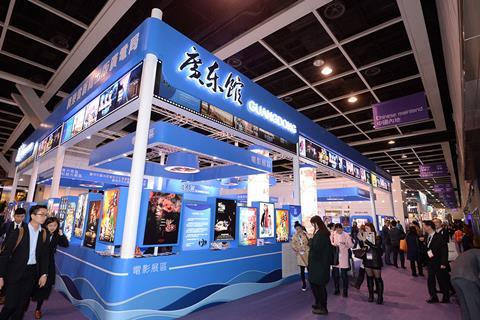
As Filmart gets underway, it has become clear that the Chinese film sales business is currently going through a turbulent period, buffeted by the twin forces of China’s booming box office and a declining market for foreign-language films everywhere else in the world.
Among recent changes to affect Hong Kong sales companies are Distribution Workshop’s decision to relocate its international sales business to Taipei and a changing of the guard at Emperor Motion Pictures.
At the same time, Beijing-based Huayi Brothers has established an international sales arm, now that Global Road Entertainment is no longer handing its titles, and China’s Tencent Pictures is also exploring setting up a sales division.
While it might be tempting to interpret these moves as a shift of distribution power towards Beijing, which has become the capital of the Chinese production business, the reality is more complex than that.
For sure, producers across Greater China are becoming more focused on the mainland China market – where four films grossed a combined $1.5bn over the Chinese New Year holidays – while the international market is increasingly difficult. “Only Chinese martial arts films are selling internationally, while the films that work in China are mostly comedies and romantic dramas that often don’t travel,” says Bravos Pictures chief Ricky Tse.
Meanwhile, mainland studios are latching on to the relative simplicity of working with global streaming platforms for international distribution. “In some ways we both created and then cratered the international sales market for Chinese films, because we did well selling them to Netflix, then the producers realised they didn’t need us to do that,” says Stuart Ford, former chief of IM Global, which handled sales for Huayi Brothers and Enlight titles before it was absorbed into Global Road last year.
Making a move
But mainland Chinese companies are still decades behind Hong Kong’s sales agents in understanding the international market, and find it difficult to lure experienced execs to Beijing. Over the past decade, several mainland studios have set up international sales divisions, only to pull back when they realised the high costs and relatively low income.
“Selling to online or TV is one thing, but a theatrical release where you’re going day-and-date in several territories is much harder to coordinate,” says Distribution Workshop founder Jeffrey Chan. He adds that while there were several factors at play in the company’s decision to relocate its sales force, one of the biggest was to improve cost efficiencies in a challenging market. “As we already had offices there, we had the luxury of moving to Taiwan.”
Beijing has also seen a rise in sales companies handling independent product, including Rediance, Asian Shadows and a soon-to-be-relaunched Fortissimo Films. However, these companies are mostly handling arthouse titles, which were never the mainstay of Hong Kong’s veteran producer-sales agents.
These are unsettling times but Hong Kong’s status as an international sales hub is likely to endure.






![The Brightest SunScreen[Courtesy HKIFF]](https://d1nslcd7m2225b.cloudfront.net/Pictures/274x183/3/5/0/1448350_thebrightestsunscreencourtesyhkiff_312678.jpg)


















No comments yet